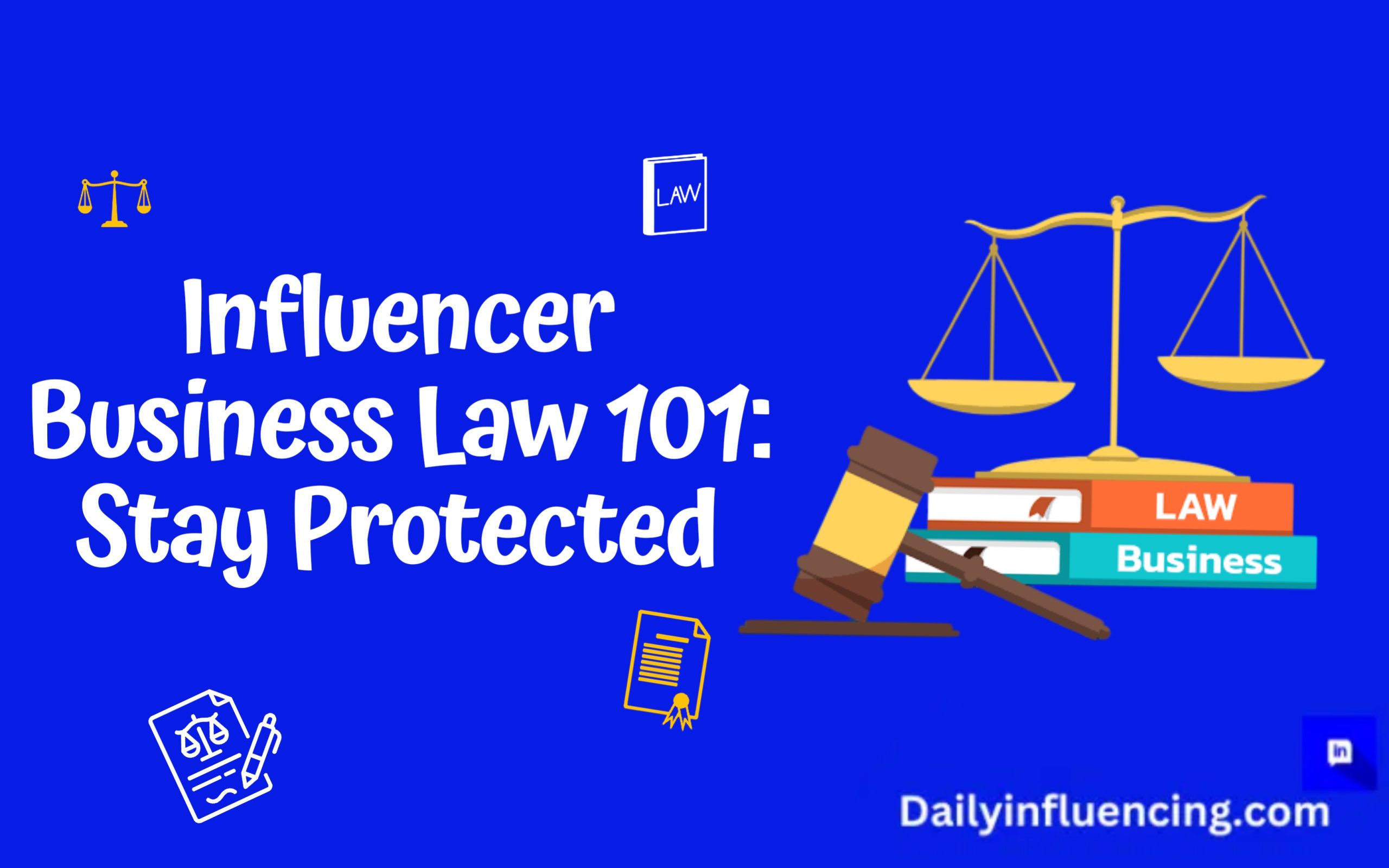
Stay protected in the influencer industry with Influencer Business Law 101: key laws & regulations for success.
INTRODUCTION
As an influencer, you’re constantly creating content, engaging with your audience, and collaborating with brands. However, amidst all the excitement and creativity, it’s easy to overlook one crucial aspect of your business: the law. Meanwhile, understanding the basics of Influencer Business Law is essential to protect yourself, your brand, and your business.
In this post, we’ll delve into the world of Influencer Business Law, exploring the key concepts, laws, and regulations that every influencer needs to know. Whether you’re just starting out or already established. This guide will provide you with the knowledge and insights necessary to protect your business and thrive in the ever-changing influencer landscape.
Understanding Influencer Business Law: The Basics
To build a successful influencer business, you must first understand the basics of influencer business law. In this section, we’ll explore the fundamental concepts and principles that govern the influencer marketing space.
Here are the key areas of law that influencers need to understand:
1. Contract Law: Negotiating Fair Deals and Protecting Your Rights
As an influencer, you’ll frequently collaborate with brands, and these partnerships are typically formalized through contracts. Contract law plays a crucial role in the influencer marketing space, and understanding its principles is vital to negotiate fair deals and protect your rights.
When entering into a contract, you must carefully review the terms and conditions to ensure they align with your interests. Pay attention to clauses related to compensation, content ownership, and termination. Additionally, be aware of your obligations and responsibilities, such as creating sponsored content, promoting products, or attending events.
2. Intellectual Property Law: Protecting Your Creative Work
As a content creator, you produce intellectual property, including photos, videos, written content, and other creative works. Intellectual property law is designed to protect these creative assets, and understanding its principles is essential to safeguard your rights.
Familiarize yourself with copyright, trademark, and patent laws to ensure you’re not infringing on others’ rights. Additionally, take steps to protect your own intellectual property, such as registering copyrights, using watermarks, and including copyright notices in your content.
3. Consumer Protection Law: Disclosing Sponsored Content and Avoiding Deception
As an influencer, you must comply with consumer protection laws, which regulate advertising and marketing practices. The Federal Trade Commission (FTC) requires influencers to disclose sponsored content clearly, using hashtags like #ad, #sponsored, or #partner.
Understand the FTC’s guidelines on sponsored content and ensure you’re transparent about your relationships with brands. Avoid deceptive practices, such as hiding sponsored content or using fake reviews. By complying with consumer protection laws, you’ll maintain your audience’s trust and avoid facing penalties.
4. Business Structure Law: Choosing the Right Entity for Your Influencer Business
You’re considered a business owner, and you must choose a business structure that suits your needs. Familiarize yourself with the different types of business entities, such as sole proprietorships, limited liability companies (LLCs), and corporations.
Understand the advantages and disadvantages of each structure, including tax implications, liability protection, and registration requirements. Choose a business structure that aligns with your goals, and register your business accordingly.
5. Tax Law: Understanding Your Obligations as an Influencer
As an influencer, you’re required to report your income and pay taxes accordingly. Familiarize yourself with tax laws, including self-employment taxes, business expenses, and deductions.
Understand your tax obligations, and ensure you’re meeting the necessary requirements. Consult with a tax professional or accountant to ensure you’re taking advantage of available deductions and credits.
Business Structure: Choosing the Right Entity for Your Influencer Business
Selecting the right business structure is crucial for protecting your personal assets, minimizing taxes, and establishing credibility with brands.
The most common business structures for influencers:
- Sole Proprietorship: A Simple but Risky Option => A sole proprietorship is the simplest and most common business structure for influencers. You’ll operate your business under your personal name, and your business income will be reported on your personal tax return. However, this structure offers no liability protection, which means your personal assets are at risk in case of business debts or lawsuits.
- Limited Liability Company (LLC): A Popular Choice for Influencers=> An LLC is a hybrid business structure that combines the liability protection of a corporation with the tax benefits of a partnership. As an LLC owner, you’ll enjoy personal liability protection, which means your personal assets are separate from your business assets.
- Corporation: A More Formal Structure for Established Influencers=> A corporation is a more formal business structure that offers liability protection and tax benefits. As a corporation owner, However, corporations are subject to double taxation, which means your business income will be taxed at the corporate level and again at the individual level.
- Partnership: A Suitable Option for Influencer Collaborations=> A partnership is a business structure that involves two or more owners who share ownership and control of the business. As a partnership owner, you’ll enjoy pass-through taxation, which means your business income will be reported on your personal tax return.
Choosing the Right Business Structure: Factors to Consider
When selecting a business structure, consider the following factors:
- Liability protection: Will you be protected from personal liability in case of business debts or lawsuits?
- Taxation: How will your business income be taxed, and what are the implications for your personal tax situation?
- Ownership and control: How will ownership and control be structured, and what are the implications for decision-making and profit distribution?
- Formalities and compliance: What are the formalities and compliance requirements for your chosen business structure, and how will you maintain compliance?
By carefully considering these factors, you can choose a business structure that aligns with your goals, protects your personal assets, and supports the growth of your influencer business.
Influencer Business Law: Contracts and Agreements
Let’s discuss contracts and agreements. As an influencer, you will collaborate with brands, managers, and other partners, and understanding contracts protects you and your business.
What is a Contract?
You create a contract when you agree in writing with two or more parties. This agreement outlines the terms, conditions, and expectations of your partnership. Think of it as a roadmap for your collaboration.
Key Elements of a Contract
When you review a contract, look for these essential elements:
- Parties Involved: Clearly identify the parties involved.
- Scope of Work: Define your responsibilities and deliverables.
- Compensation: Specify payment terms and rates.
- Intellectual Property: Outline ownership and usage rights.
- Termination: Establish terms for terminating the contract.
Red Flags to Watch Out For
When you review a contract, beware of these red flags:
- Unclear Language: Avoid contracts with vague or ambiguous language.2
- Unfair Terms: Watch out for unfair terms, such as excessive payment terms or unrealistic deadlines.
- Lack of Intellectual Property Protection: Ensure the contract protects your intellectual property rights.
Intellectual Property and Influencer Business Law: Protecting Your Content
As an influencer, you create valuable content that requires protection. You must understand intellectual property law to safeguard your rights and interests.
Intellectual Property Protection in Influencer Business Law
You create original works, and intellectual property law protects them, including:
- Copyrights: You hold copyrights for original literary, dramatic, musical, and artistic works.
- Trademarks: You register trademarks to protect your brand names, logos, and slogans.
- Patents: You apply for patents to safeguard your inventions and innovations.
Importance of Protecting Your Content
You must protect your content to:
- Maintain ownership and control
- Prevent others from using or stealing your work
- Ensure fair compensation for your creations
How to Register for Copyrights and Trademarks
You register your copyrights and trademarks to gain additional protection:
- Copyright Registration: You file with the U.S. Copyright Office to create a public record of your ownership.
- Trademark Registration: You file with the U.S. Patent and Trademark Office to establish exclusive rights to your brand identity.
Sponsorships and End Disclosures: Compliance with Influencer Business Law
As an influencer, you partner with brands to promote their products or services. To comply with the Federal Trade Commission (FTC) guidelines, you must clearly disclose these sponsorships.
Disclosure Requirements in Influencer Business Law
You must disclose sponsored content clearly and conspicuously:
- Use hashtags like #ad, #sponsored, or #partner
- Include a clear statement, such as “This post is sponsored by [Brand Name]”
- Avoid ambiguous language or hidden disclosures
Importance of Clear Disclosures and Transparency
Clear disclosures maintain transparency and trust with your audience:
- Build credibility with your followers
- Avoid deceiving your audience
- Comply with FTC guidelines
Consequences of Non-Compliance
Failure to comply with FTC guidelines can result in:
- Warning letters from the FTC
- Fines and penalties
- Damage to your reputation and credibility
CONCLUSION
Influencer business law may seem complex, but by taking the time to learn and understand these essential concepts. As an influencer, understanding the basics of influencer business law is crucial to protecting yourself, your brand, and your business. By grasping key concepts such as contracts, intellectual property, and sponsorship disclosures, you’ll navigate the influencer marketing space with confidence.
Remember to stay informed, adapt to changes, and always prioritize transparency and compliance.




